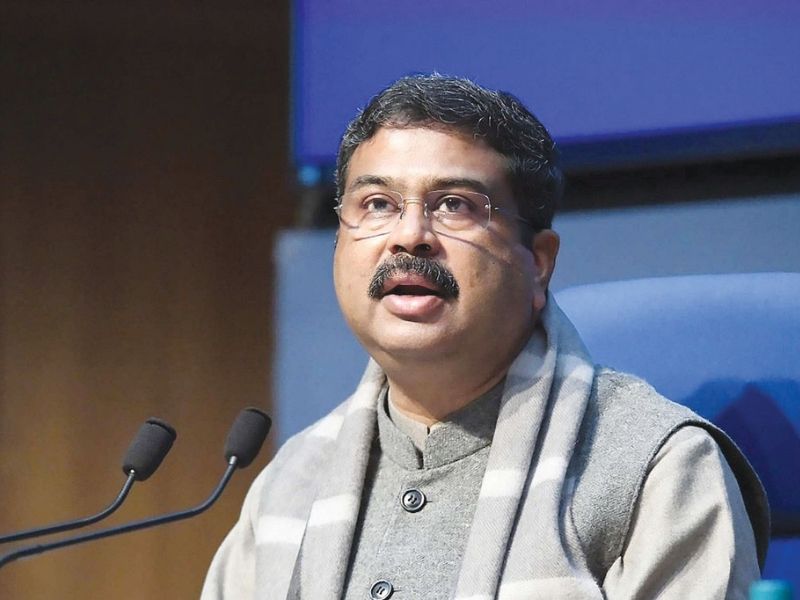Union Education Minister Dharmendra Pradhan on Sunday attacked the West Bengal government for its opposition to the New Education Policy unveiled in 2020, wondering whether the opposition stemmed from “political considerations.”
Pradhan who also wondered if the state was against clauses that could raise employability of students, tried to defend the NEP which has been attacked by many non-Hindi speaking state governments by claiming that it gave equal importance to local languages.
After the NEP was unveiled two years back, former state education minister Partha Chatterjee had said that it is the agenda of the RSS to give importance to subjects related to Vedic philosophy and ancient Indian tradition. There has also been opposition to its language formula which is seen as tilting towards Hindi and Sanskrit.
Pradhan said, “It (NEP) was done in a spirit of consultative mechanism in a scientific manner. Does West Bengal oppose that very spirit? Are they opposed to a committee helmed by a scientist like K Kasturirangan for reasons other than academics?”
The Union minister, who was talking to reporters on the sidelines of an event at a city hotel, said that most of the state governments were not opposed to the NEP irrespective of their political leanings.
“Local language is given utmost importance in the NEP. Does this government look at things in a different way? Doesn’t the Bengal government wish to raise employability of its people? NEP 2020 stands for knowledge-based employability,” Pradhan, a BJP leader, said.
A top educationist, who did not wish to be named said that the new policy underscores teaching all subjects, including technical ones, in the mother tongue which is impractical.
The TMC Government had undone a decision of the earlier Left Front government taken in the 1970s which made education in the mother tongue compulsory in primary classes and allowed English to be taught only in higher classes. Many had felt this had reduced the employability of students from West Bengal and blocked their avenues for higher studies elsewhere in India and abroad as well as in national competitive exams like the Civil Services.
Pradhan said that the state government is welcome to add more value to the NEP, which is a “basic document”.
“I hope this decision (opposition to NEP) is not prompted by political considerations,” Pradhan added.
The Union minister said he has learnt that the West Bengal government has recently formed a panel to look into aspects of the NEP. “It is unfortunate if they are opposed to the spirit of the draft.”
There is a growing perception that the West Bengal government wants to oppose every move by the Centre, he said.
West Bengal Education Minister Bratya Basu recently said education is on the concurrent list and the TMC government will never accept imposition of the NEP as the state has its own culture and education system.
The state government has formed a 10-member committee comprising experts in various fields to get feedback about the NEP and formulate an education policy tailored to the needs and interests of students of West Bengal.
Critics have opposed the NEP claiming that the policy seeks to impose Hindi and bring curriculum changes in the name of uniformity which went against federalism. They also alleged that the NEP tries to centralise the entire higher education system, obliterating the current mechanism which gives leeway to universities to have their own Syllabus.
Partha Chatterjee in his criticism earlier had said the NEP will encourage corporatisation of the education system and destroy the state-funded education sector from school to university levels.
In a vast country like India, which has a diversified socio-economic condition, a common yardstick cannot be applied to all states, especially at the primary and secondary levels of education, Chatterjee had said.
On the CBI probe ordered by the Calcutta High Court into alleged irregularities in state government aided schools, Pradhan said, “Though education is on the concurrent list, the issue you are raising is in the domain of the state.
“I can only say that for future citizens of the country, there should not be any irregularities in teacher recruitment…. Law will take its own course,” he said.
Pradhan said he has asked IIT Kharagpur authorities to turn its research and development centre at Rajarhat near here into a Start-Up Incubation Centre.
“Kolkata is the natural point for economic activities in eastern India. The start-up incubation centre will help not only IITians but also other entrepreneurs to float start-ups,” Pradhan said.
